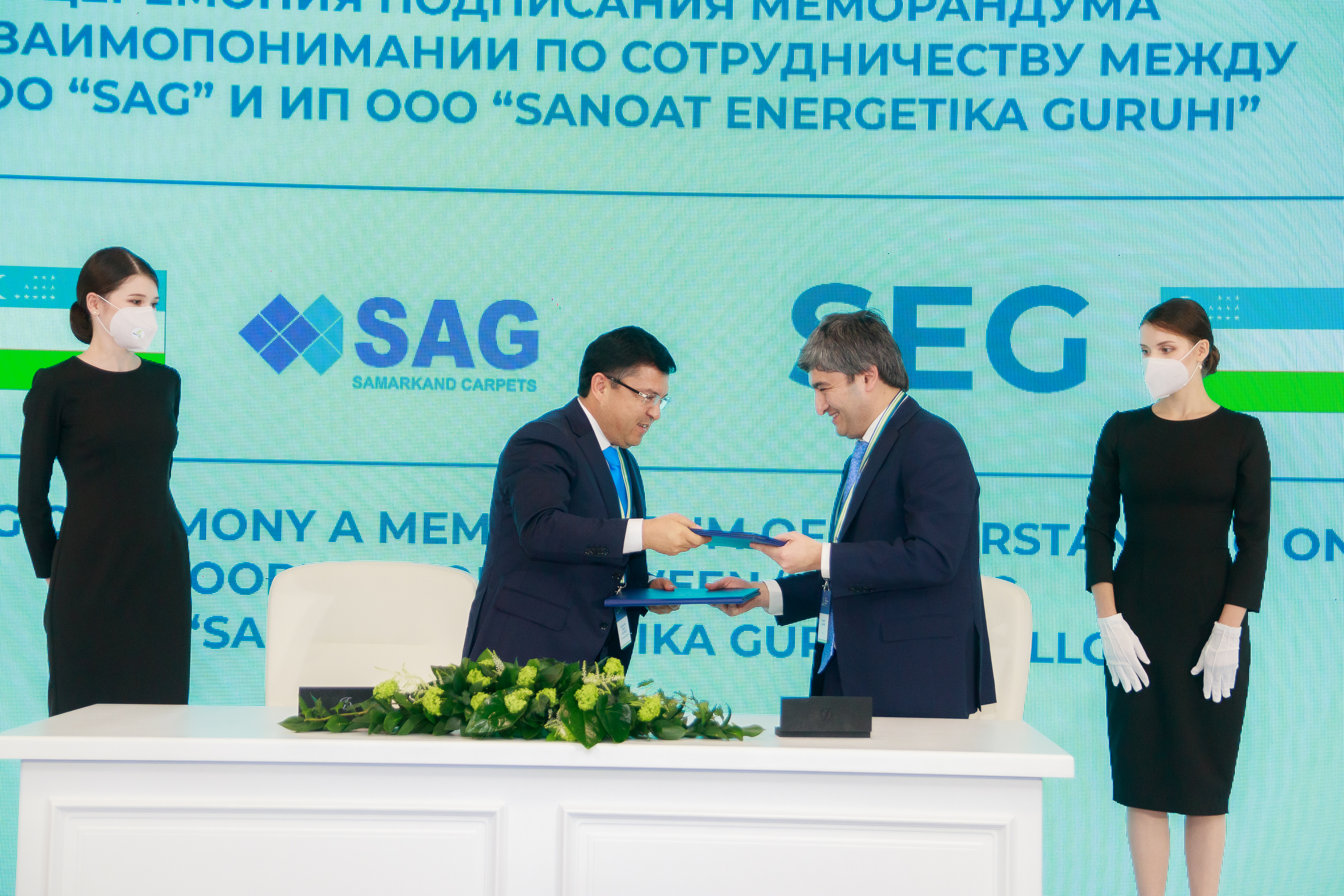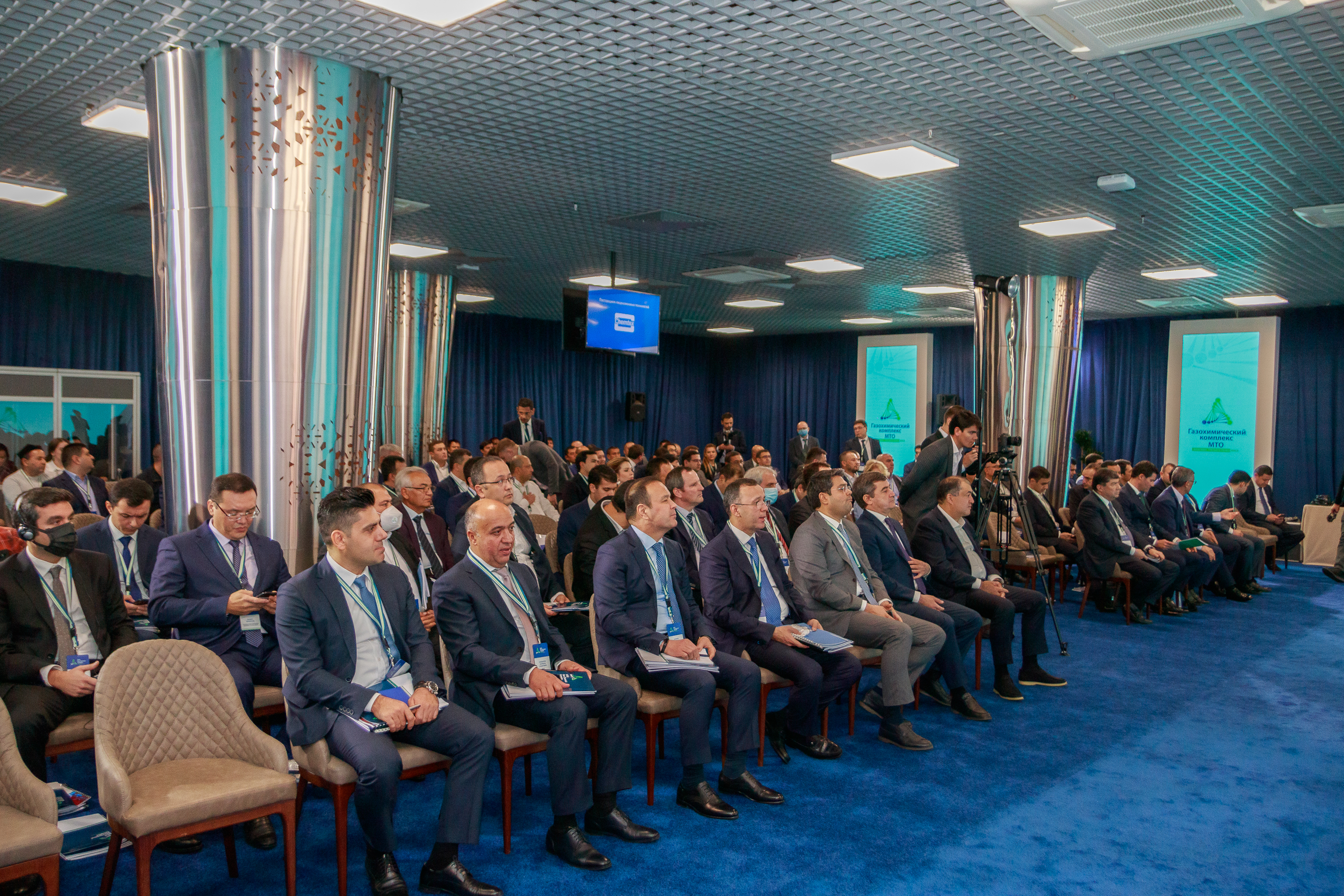Gas-chemical project based on MTO technology set to deliver 2,300 new jobs and $2 billion in tax revenue. Free Economic Zone to support industrial complex established in Karakul district of the Bukhara region.
Tashkent, Uzbekistan — November 16, 2021 — Representatives of business and government have participated in the forum “Gas Chemical MTO Complex: Technologies of the New Uzbekistan” at the Humo Arena in Tashkent.
Uzbekistan’s Minister of Energy Alisher Sultanov and MTO complex project director Masrur Shakirov, who is also deputy CEO of the founding company SEG (formerly Jizzax Petroleum), delivered a welcome address to an audience of state officials, oil producers, leaders of the gas-chemical industry, suppliers, potential customers and off-takers. They were given a detailed update on the construction and operation of the MTO (methanol-to-olefin) based gas-chemical complex located in Karakul, in the Bukhara region of Uzbekistan. Also present at the forum was a representative of Wood (Italy), the company designing the complex.

The $2.5-billion project is expected to commence operations in the fourth quarter of 2023 and will provide Uzbekistan’s domestic industry with olefinic hydrocarbons, a vital raw material for the country. The MTO technology, which is core to the project, has no direct competitors in the CIS region. When complete, the complex will greatly accelerate Uzbekistan’s import substitution, economic diversification, and also the development of related domestic industries.
To facilitate economic growth, a Free Economic Zone (FEZ) has been established in the Karakul area, attracting domestic and foreign producers with tax exemptions and permission to conduct business in foreign currencies. Uninterrupted energy supply, partly from renewable sources, is guaranteed.
Industrial development in the FEZ is estimated to create more than 2,300 new jobs and generate more than $2 billion in additional tax revenues over the next 20 years.
Alisher Sultanov, Energy Minister of the Republic of Uzbekistan, said:
“Uzbekistan is confidently following the path of expanding capacities for deep processing of natural gas, which will allow even deeper diversification of the country’s economy. And the new petrochemical plant using MTO technology is a prime example. The export of gas as a cheap raw material is replaced by the creation of products with high added value through deep processing of hydrocarbon raw materials. The creation of such products on the basis of domestic natural gas will not only meet the needs of the country, but also significantly increase the flow of currency to Uzbekistan in comparison with raw material exports.”
Masrur Shakirov, Deputy CEO of SEG and MTO Project Manager, said:
“The MTO project is a vivid example of the new Uzbekistan. Deep processing of hydrocarbon raw materials, production of modern and unique petrochemical products that meet modern requirements is an opportunity to provide the population and sectors of the economy with strategically important raw materials, which will not only become the basis for the development of new businesses in the Republic, but also ensure a high rate of economic growth, increase the competitiveness of the nationaleconomy. The project is unique and today has no analogues in the CIS countries.”
Andrea Ferrera, Technical Director of Wood (Italy), said:
“The MTO Initiative is an excellent example of a ’fit for purpose’ project in which the economic and social needs of a country are met through the use of local resources. Wood is proud to have been a part of this initiative since its inception, helping to develop the country and supporting the client to implement a project using modern environmentally friendly technologies supported by efficient and sustainable engineering solutions. ”
The forum was planned in part to familiarise potential customers with the complex’s output. At the forum, memorandums of understanding were signed with a number of local producers and international off-takers, including:
- KTM SA (Turkey), a leading trading company with extensive experience in logistics and the trade in polymers and petrochemical products
- SAG, leading carpet manufacturer in the CIS and one of the top five manufacturers in the world
- International Beverages Tashkent, official bottler for PepsiCo in Uzbekistan producing non-alcoholic drinks for famous international brands
- Urgaz, one of the leading textile manufacturers in the CIS countries and Central Asia.
- ETS U-STAN, a Swedish-Russian joint venture and major regional trading company
Juan Miguel Gonzalez, Director of Business Development for Large-scale Projects in Europe, Africa, Russia and the CIS for Air Products and Chemicals, Inc. (US), said:
“As a company, we always focus on long-term and sustainable cooperation with our key partners around the world. And we are inspired by the future of our company both in Uzbekistan and in the whole Central Asia region. Today we are delighted to speak at this conference as we explore the potential for investment opportunities to monetize gas through the use of our innovative industrial gas technologies, knowledge, experience and expertise.”
The complex will have production capacity of 720,000 tons of finished polymer products — enough to satisfy all domestic demand. The facility will produce diverse products from the core inputs of ethylene and propylene, which will substitute various raw materials currently being imported, and contribute significantly to Uzbekistan’s economic growth.
Over 70% of the plant’s production will be sold on the domestic market, enabling Uzbekistan’s industry to satisfy domestic demand and also export various raw materials to CIS countries, China, Turkey, and South-East Asian nations.
Supported by the technology of Chemtex Global Corporation (China), the plant will produce polyethylenterephthalat (“PET”). PET is a polymer much in demand and is used in the textile and food industries. One of its production inputs, monoethylene glycol, produced with the technology of the company Scientific Design Company Inc. (US), will fulfil demand for hydraulic fluids/solvents production, plus antifreeze.
In another first for Uzbekistan, and in collaboration with Versalis S.p.A., subsidiary of Eni S.p.A. (Italy), low density polyethylene will be produced with a tubular reactor under ultra-high pressure. This technology allows one unit to consistently produce two types of end products — low density polyethylene and ethylene vinyl acetate.
Low density polyethylene is a vital material in many industries, including agriculture, food and parapharmaceuticals.
Ethylene vinyl acetate is unique to Uzbekistan’s market and the wider CIS region. It also has many different uses, but is in high demand especially in the production of solar panels.
Polypropylene production will take place in collaboration with W. R. Grace & Co. (US)’ a world-leader in this field. Polypropylene is a versatile and important raw material, used in the textile, parapharmaceuticals, electrical engineering, and automotive industries.
The project also includes plans to create a new educational institution in Samarkand, to be called the International Technical University, to train industry specialists.
The MTO plant will seek to minimize the project’s impact on the environment. Environmental standards compliance will be monitored and confirmed by internationally recognised environmental consultants, Mott MacDonald Group Limited (UK).
